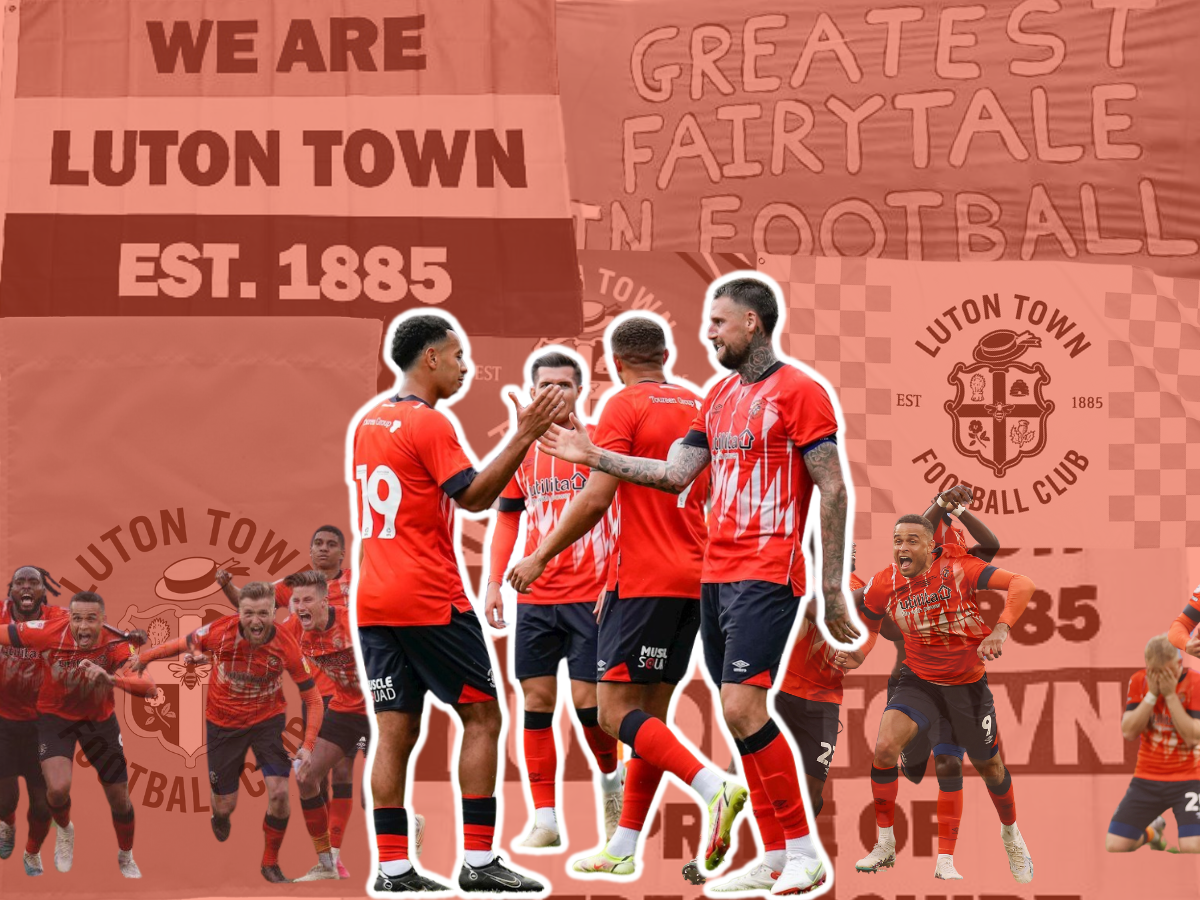Luton are officially relegated, but they are a resilient club that won’t back down and the psychological culture is their ‘secret ingredient’ to making it back to the promise land of the Premier League.
Relegation has long been looming over the minds of Luton all season, and the loss to Fulham was the final nail in the coffin of their battle to stay in the Premier League.
As they come back down to the Championship there’s much more of a familiarity as they’ve been in this position before, and I’m not talking about the league.
The Hatters have faced relegation numerous times before, and let’s not forget that it was just over one decade ago that they were playing in non-league.
This relegation feels different for Luton…
In 2008, Luton Town FC faced what seemed like a death sentence with one foot in the grave after being docked 30-points by the FA. The harshest punishment ever seen.
This marked the beginning of the club’s freefall, with back-to-back relegations from League One and spending a depressive five-year stint in the Conference. The scars of this dark era are still visible today, as every fan is reminded by the ‘betrayed by the FA’ flag hung in the corner of Kenilworth Road.

From the depths of despair emerged resilience and determination that has become the hallmark of Luton Town’s journey back to the topflight. Lessons learned during those dark times in non-league have proved invaluable.
The way of the business is that players, managers, and staff come-and-go, but one constant remains at Luton – the unwavering culture instilled by the club’s fan ownership when they took the reins.
What is the ‘Luton way’?
There’s no denying that Luton Town’s recruitment has been top notch which naturally plays a huge part in any club’s success.
Unlike other clubs, they haven’t had the cash to throw at the game and have developed their own recruitment ‘checklist’ as a type of ‘Luton way’ of doing things.
It isn’t always about the most valuable player on the pitch, as they keep looking to invest in the personal qualities of each player to form a rounded team.
Jared Roberts-Smith, Luton’s Head of Performance. has witnessed a number of players and different characters walk through the doors since he first joined Luton in 2016 when they were in League Two. He says, “before a player joins, the club gets strong character references from people that know those players and it’s a staple requirement for someone coming through the doors that they’re a good person that they want to keep improving.
“One of the first things said to any player coming in is, ‘we’re honest, we respect each other, and we expect humility’.
“So, if you don’t like something or you don’t understand something, ask a question rather than dismissing it and displaying poor body language. If that does happen, we respect you, so we’re going to pull you up on it and challenge you.
“It’s the same for anyone. If I didn’t like something that was going on and I displayed a negative reaction, I’ll get pulled up on it and that way we hold people accountable for what they do”.
What actually is culture at Luton?
“Culture is often a word you hear in football, but it almost defines who we are”, says Jared.
He says, “it varies from club-to-club, and it essentially represents you’re working methods and aligning that with the methods of the manager. For us, it sets the standard for everyone around the club.
“Culture is really a part of everything that we do, but if you don’t sort of live and breathe it, and really believe in it, then it can become a little bit fluffy.
“It’s one thing putting graphics up on a wall or pinning it up in the changing room, but they become redundant and a space filler if you don’t believe in it and drive it.”
‘Those good times will swing back around’
If Luton have shown us anything from their stint in the Premier League is that they have a ‘never say die’ attitude and they didn’t go down without a fight.
Jared says, “there will be ups but you’re going get tested the most in your down times and those tough moments.
“To stay in this league, you’ve got to be resilient, durable and believe in yourself. When something goes wrong we all re-group and aim to come back stronger and it’s only a matter of time before those good times will swing back around”.
The strength of strong relationships at Luton
If you’ve played almost any sport in the past you might have heard the phrase ‘matchday starts at training’. For Luton, it extends far beyond that as they believe part of their success is generated by building a strong bond around the team.
Jared says, “generating and fostering relationships with the players and athletes are so important with the work that we do.
“It means that you’re more relatable and I’ve found that when you’re more relatable people want to work hard for you and buy into what you want to do.
“When you’ve got that relationship with the people you work with you don’t want to let each other down, you push each other, and get the best out of each other. It’s the same in any business but I think it’s one of the most important things when working in football and especially at Luton.
“I’d go above and beyond for them, whether that’s a text late at night, a call to check they’re okay, or if there’s something going on outside of the building. Whatever that looks like, can push them further and show that you’re willing to go above and beyond.”
The strength of these relationships is testament to their success and sometimes it’s the small things that matter the most. Jared says, “I have a really good relationship with the chef at work, we’ve got our own handshake, and I’ve dropped him home after work a few times. I’d do that for anyone at the football club because I think it’s important to really value people and those relationships.
“I genuinely can’t speak highly enough of everyone at the club. There’s a really strong culture and I think it’s reflected and upheld strongly by everybody in the building”.
The chef is part of the culture and team at Luton too…
Almost everyone who works at the club interacts daily with one of the players, coaches and managers – but we’ve been speaking to the man who helps makes their meals, Sean O’Connell who is the Sports Performance Chef.
He started working at Luton serving sausage rolls, burgers, and of course, Bovril in the kiosks on matchdays. Now, he makes around 220 meals per day for the whole club, travels on the team bus, and even flew out to Dubai earlier in the season for their training camp.
Sean says, “I absolutely love going into the training ground and speaking to all the boys. Sometimes I think to myself, it’s Ross Barkley, it’s Carlton Morris, and I can’t believe it.
“It’s still kind of strange when I watch them on tele because I know their habits, what they don’t like to eat, and what they do like to eat. The little bit of information like that, for me, makes you realise they’re real people and not just famous at the end of day. They’re down to earth nice guys, and I think them being nice guys makes me want to do it more”.
Being a chef at the club means that Sean can witness the team atmosphere from a slightly different perspective. He says, “we’ve got an open kitchen and it’s all open space. So, the players can see you what we’re doing, and we can often hear conversations pretty much from the restaurant when they sit down.
“One thing I’ve seen is if there’s any negative energy, it gets turned around into positivity really quickly. They’re all passionate and fighting for each other, and you can see when one of them is down, they’ll ask him why and they will work together and get back up.
“Maybe it sounds proper cliché, but if I’m being honest there really is a family feel here. We’re all really close with each other, and everyone is friendly with us.
“It makes me feel proud to be from Luton. A lot of people shit on Luton, but I think it’s a good place, especially with the club. Working here you feel really connected with the staff and you’re all working towards one goal at the end of the day – that’s to keep Luton back where we belong”.
What is Luton’s secret ingredient?
We wouldn’t be doing you, the reader, justice if we didn’t ask the chef what he thinks the secret ingredient to the culture at the club is…
He says, “If I want to make good food, obviously the more care and attention I put into my food the better it’s going to taste, that’s just natural. When I come into work and look around the training ground I’d say the secret ingredient is just that – it’s a lot of love, care and attention that comes from everyone around the club”.

Jared is the Head of Performance at Luton Town Football club.
He first joined the club in 2016 working with Nathan Jones,
he then left to work at Stoke City and Melbourne in Australia,
before returning to Luton before the 2021/22 season
Related Content




